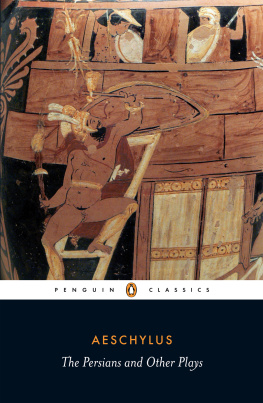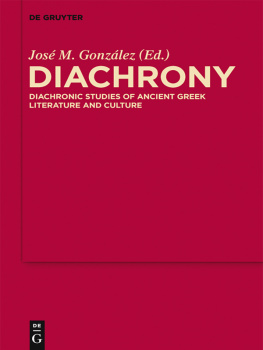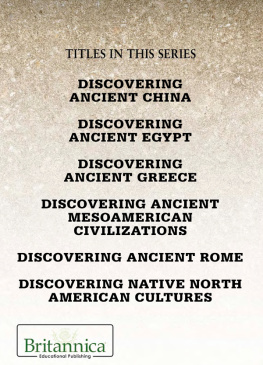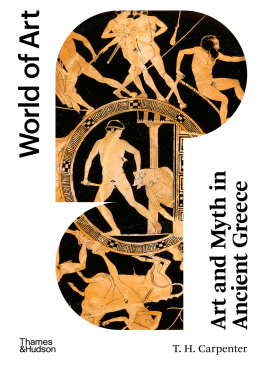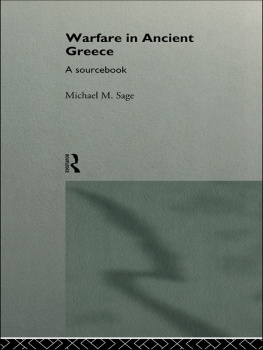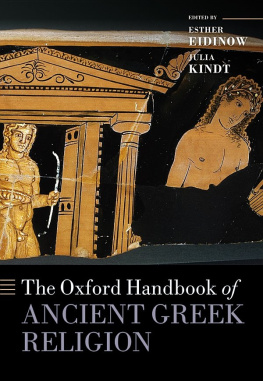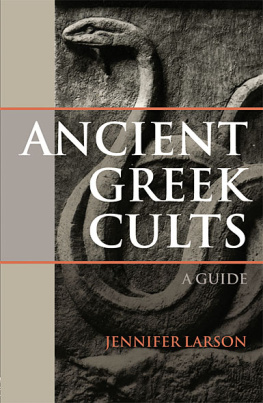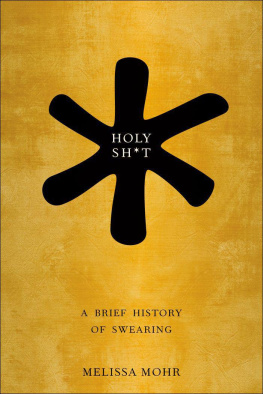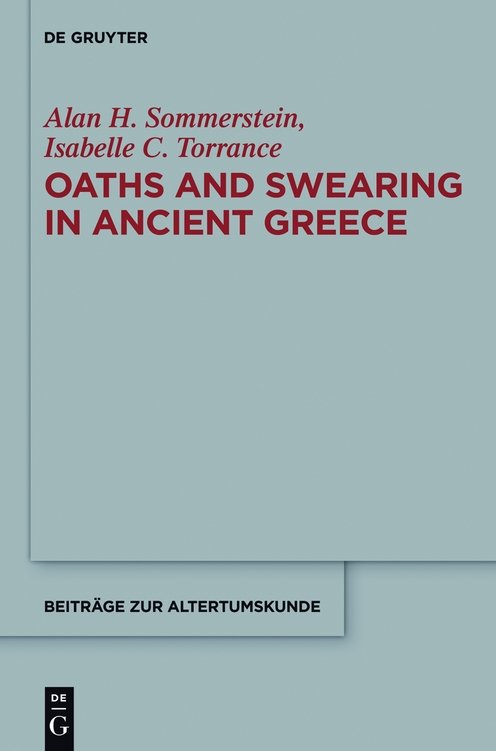Bibliography
Alaux, J. (2011), Acting myth: Athenian drama, in: K. Dowden / N. Livingstone (eds.), A Companion to Greek Mythology , Oxford, 141-56.
Allan, A. (2007) Masters of manipulation: Euripides (and Medeas) use of oaths in Medea , in Horkos 113-24.
Allan, W. (2006), Divine justice and cosmic order in early Greek epic, JHS 126, 1-35.
Allen, D. S. (2000), The World of Prometheus : the politics of punishing in democratic Athens , Princeton.
Anderson, C.A. (1995), Athenas Epithets: their structural significance in plays of Aristophanes , Stuttgart.
Applebaum, S. (1979), Jews and Greeks in Ancient Cyrene , Leiden.
Arend, W. (1933), Die typischen Szenen bei Homer , Berlin.
Arnott, W G. (1996), Alexis: The Fragments , Cambridge.
Austin, J.L. (1962), How to Do Things with Words , Oxford.
Austin, M.M. / Vidal-Naquet, P. (1977), Economic and Social History of Ancient Greece, Berkeley.
Avery, H.C. (1965), Heracles, Philoctetes, Neoptolemus, Hermes 93, 279-97.
Avery, H.C. (1968), My tongue swore, but my mind is unsworn, TAPA 99, 19-35.
Bachvarova, M. (2007), Oath and allusion in Alcaeus Fr. 129, in Horkos 179-88.
Bacon, H.H. (2001), The Furies homecoming, CP 96, 48-59.
Barrett, W. S. (1964), Euripides: Hippolytus , Oxford.
Batchelder, A.G. (1995), The Seal of Orestes: self-reference and authority in Sophocles Electra , London.
Bayliss, A.J. (2009) Using few words wisely? Laconic swearing and Spartan duplicity, in: S.J. Hodkinson (ed.), Sparta: comparative approaches , Swansea, 231-60.
Baynham, E. (2012), The abominable quibble: Alexanders massacre of Indian mercenaries at Massaga, in: P.G. Dwyer / L. Ryan (eds.), Theatres of Violence: massacre, mass killing and atrocity throughout history, New York, 27-37.
Belfiore, E. (1994), Xenia in Sophocles Philoctetes , CJ 89, 113-29.
Bernard, W. (2001), Das Ende des dipus bei Sophokles: Untersuchung zur Interpretation des dipus auf Kolonos , Munich.
Bers, V. (2003), Demosthenes, Speeches 50-59 , Austin.
Berti, I. (2006), Now let Earth be my witness and the broad heaven above, and the down flowing water of the Styx (Homer, Ilias XV, 36-37): Greek oath rituals, in: E. Stavriano-poulou (ed.), Ritual and Communication in the Graeco-Roman World , Lige, 181-209.
Bickerman, E.J. (1976), Couper une alliance, in: E.J. Bickerman, Studies in Jewish and Christian History i, Leiden, 1-31..
Biehl, W. (1986), Euripides: Kyklops , Heidelberg.
Blundell, M.W. (1989) Helping Friends and Harming Enemies: a study in Sophocles and Greek ethics , Cambridge.
Blundell, S. (1995), Women in Ancient Greece, Cambridge MA.
Boedeker, D.D. (1979), Sappho and Acheron, in: G.W. Bowersock / W. Burkert / M.C.J. Putnam (eds.), Arktouros: Hellenic studies presented to Bernard M.W. Knox on the occasion of his 65th birthday , Berlin, 40-52.
Boedeker, D.D. (1987), The two faces of Demaratus, in: B.D. Dickman et al. (eds.), Herodotus and the Invention of History , Buffalo, 185-201.
Boedeker, D.D. (1991) Euripides Medea and the vanity of , CP 86, 95-112.
Boegehold, A. L. (1999), When a Gesture was Expected: a selection of examples from archaic and classical literature , Princeton.
Bolmarcich, S. (2007), Oaths in Greek international relations, in Horkos 26-38.
Bonner, R.J. / Smith, G. (1930-8), The Administration of Justice from Homer to Aristotle (2 vols.), Chicago.
Bosworth, A.B. (2010), Truth and falsehood in early Hellenistic propaganda, in: A.J. Turner et al. (eds.), Private and Public Lies : the discharge of despotism and deceit in the Greco-Roman world , Leiden, 39-50.
Bowie, A.M. (1993), Aristophanes: myth, ritual and comedy , Cambridge.
Bowra, C.M. (1944) Sophoclean Tragedy , Oxford.
Bowra, C.M. (1964), Pindar , Oxford.
Bradley, P.J. (2010), Irony and the narrator in Xenophons Anabasis , in: V.J. Gray (ed.), Oxford Readings in Classical Studies: Xenophon , Oxford, 520-52.
Braun, M. (1998), Die Eumeniden des Aischylos und der Areopag , Tbingen.
Braund, D. (1998), Herodotus and the problematics of reciprocity in ancient Greece, in: C. Gill et al. (eds.), Reciprocity in Ancient Greece , Oxford, 159-80.
Bremer, J.M. (1990), Pindars paradoxical and a recent controversy over the performance of his epinicia, in: S. R. Slings (ed.) The Poets I in Archaic Greek Lyric , Amsterdam, 41-58.
Brown, A.L. (1983), The Erinyes in the Oresteia, JHS 103, 13-34.
Brown, A.L. (1984), Eumenides in Greek tragedy, CQ 34, 260-81.
Brown, C.G. (1997), Iambos, in: D.E. Gerber (ed.), A Companion to the Greek Lyric Poets , Leiden, 13-88.
Budelmann, F. (2000), The Language of Sophocles: communality, communication and involvement , Cambridge.
Bundy, E.L. (1986), Studia Pindarica , Berkeley.
Burian, P. (1972), Supplication and hero cult in Sophocles Ajax , GRBS 13, 151-6.
Burian, P. (1974) Suppliant and savior: Oedipus at Colonus, Phoenix 28, 408-29.
Burkert, W. (1970), Jason, Hypsipyle and new fire at Lemnos, CQ 20, 1-16.
Burkert, W. (1972), Homo Necans: Interpretationen altgriechischer Opferriten und Mythen , Berlin.
Burkert, W. (1983), Homo Necans: The anthropology of ancient Greek sacrificial ritual and myth (tr. P. Bing), Berkeley.
Burkert, W. (1985), Greek Religion (tr. J. Raffan), Cambridge MA.
Burkert, W. (1996), Creation of the Sacred: tracks of biology in early religion, Cambridge MA.
Burnett, A.P. (1973) Medea and the tragedy of revenge, CP 68, 1-24.
Burnett, A.P. (1983), Three Archaic Poets: Archilochus, Alcaeus, Sappho , London.
Burnett, A.P. (1985), The Art of Bacchylides , Cambridge MA.
Burnett, A.P. (1989), Performing Pindars odes, CP 84, 283-93.
Burnett, A.P. (1998), Revenge in Attic and Later Tragedy , Berkeley.
Burnett, A.P. (2005), Pindars Songs for Young Athletes of Aigina , Oxford.
Buxton, R.G.A. (1982), Persuasion in Greek tragedy: a study of Peitho , Cambridge.
Buxton, R.G.A. (1994), Imaginary Greece: The Contexts of Mythology , Cambridge.
Cairns, D.L. (1993), Aids: the psychology and ethics of honour and shame in ancient Greek literature , Oxford.
Cairns, D.L. (2010), Bacchylides: Five Epinician Odes , Cambridge.
Calame, C. (1998) Mort hroque et culte mystre dans l dipe Colone de Sophocle, in: F. Graf (ed.), Ansichten griechischen Rituale: Geburtstag-Symposium fr Walter Burkert, Stuttgart, 326-56.
Calame, C. (2011), Enunciative fiction and poetic performance: choral voices in Bacchylides Epinicians , in: L. Athanassaki / E.L. Bowie (eds.), Archaic and Classical Choral Song: performance, politics and dissemination , Berlin, 115-38.
Calder, W.M. (1974), Sophocles, Oinomaos and the east pediment at Olympia, Philologus 118, 203-14.
Callaway, C. (1993), Perjury and the unsworn oath, TAPA 123, 15-25.
Callaway, C. (1998), Odysseus three unsworn oaths, AJP 119, 159-70.
Canevaro, M. / Harris, E.M. (2012), The documents in Andocides On the Mysteries , CQ 62, 98-129.
Carastro, M. (2012), Fabriquer du lien en Grce ancienne: serments, sacrifices, ligatures, Mtis 10, 79-100.
Carawan, E.M. (1998), Rhetoric and the Law of Draco , Oxford.
Carawan, E.M. (1999) The edict of Oedipus ( Oedipus Tyrannus 223-51), AJP 120, 187-222.
Carawan, E.M. (2007) Oath and contract, in Horkos 71-80.
Carey, C. (1981), A Commentary on Five Odes of Pindar , New York.
Carey, C. (1986), Archilochus and Lycambes, CQ 36, 60-7.
Carey, C. (1989), Performance of the victory ode, AJP 110, 545-56.
Carey, C. (1991), The victory ode in performance: the case for the chorus, CP 85, 192-200.


